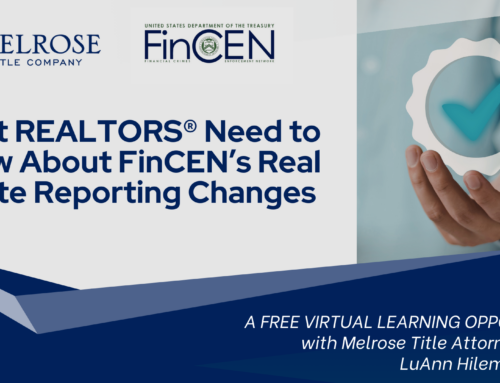We’re excited to present this new series on the Melrose Title Company blog “Ask An Attorney.” This is a way for us to answer some of the more commonly asked questions and provide clarity and understanding for consumers. In this edition of “Ask An Attorney,” our own attorney Jessee Bundy answers the question of whether title insurance is necessary when purchasing an owner’s policy.
 Q: MY AGENT TOLD ME THAT I DO NOT NEED TO WORRY ABOUT THE TITLE IF I JUST PURCHASE AN OWNER’S POLICY OF TITLE INSURANCE. IS THAT TRUE?
Q: MY AGENT TOLD ME THAT I DO NOT NEED TO WORRY ABOUT THE TITLE IF I JUST PURCHASE AN OWNER’S POLICY OF TITLE INSURANCE. IS THAT TRUE?
The short answer is: yes and no. Purchasing an owner’s title insurance policy is certainly the best way to protect yourself from title claims and defects. However, some property is not insurable, due to major defects in the title that require curative measures or the passage of time. A title search will reveal most defects in title. The number and nature of these defects determine whether the property can be issued coverage, as well as whether it can be properly transferred or borrowed on. When title defects are significant or numerous, these issues can create “unmarketable” title.
Title insurance is not as well understood as other types of insurance, but it is just as important, if not THE most important type to consider investing in. When purchasing property, instead of just purchasing the actual building or land, you are really purchasing the title to the property – the right to occupy and use the space. That title may be limited by rights and claims asserted by others, which may limit your use and enjoyment of the property and even bring financial loss. Title insurance protects against hidden title hazards that may threaten your financial investment.
Other types of insurance focus on possible future events and charge an annual premium. Title insurance, on the other hand, protects you from loss due to hazards and defects that already exist in the title, and it is purchased with a one-time premium that is typically paid at closing.
There are two basic kinds of title insurance: lender’s coverage and owner’s coverage.
Most lenders require lender’s title insurance when extending a loan to protect their security interest and investment in the borrower’s real estate offered in exchange as collateral. With title insurance, lenders are more willing to make money available because their risk is minimized.
Owner’s title insurance lasts as long as you, the policyholder – or your heirs – have an interest in the insured property. This may even be after you have sold the property.
An important part of title insurance involves risk elimination before insuring. This gives you, the policyholder, the best possible chance to avoid title claims and loss.
Insuring title begins with a search of public land records affecting the real estate concerned. An examination is conducted and reviewed by attorney to determine whether the property is insurable. The search is intended to find all material objections to the title of record. Often, documents that don’t clearly transfer title are discovered in the chain of title (the title history assembled from the records found in a search).
Some examples of documents that frequently raise concerns are:
- Deeds, wills and trusts that contain improper wording or incorrect names
- Outstanding mortgages and judgments, or a lien against the property because the seller has not paid taxes
- Easements that allow construction of a road or utility line
- Pending legal action against the property that could affect a purchaser
- Incorrect notary acknowledgments
Through the search and examination, title problems are disclosed, so they can be corrected whenever possible BEFORE closing. However, even the most careful preventative work cannot locate all hidden title hazards. Hidden hazards can emerge AFTER closing that could not reasonably be discovered, resulting in unpleasant and costly surprises. Some examples include:
- A forged signature on the deed, which would mean no transfer of ownership to you
- An unknown heir of a previous owner who is claiming ownership of the property
- Instruments executed under an expired or a fraudulent power of attorney
- Mistakes in the public records
Title insurance offers financial protection against these and other covered title hazards. The title insurance company will defend against an attack on your title and either perfect the title or pay any valid claims. This may mean going to bat for you in court, drafting and filing documents to clean up your title, or paying any damages or financial loss you may incur.
Bottom line: Real estate is important and significant investment. Before you go to closing, ask about your title insurance protection and be sure to protect your investment with an owner’s title insurance policy if available.



